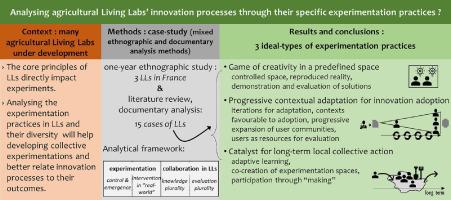Agricultural Systems ( IF 6.1 ) Pub Date : 2023-04-14 , DOI: 10.1016/j.agsy.2023.103661 Quentin Toffolini , Mourad Hannachi , Mathieu Capitaine , Marianne Cerf

|
CONTEXT
The “Living Lab” (LL) model of innovation practices is increasingly applied and strongly supported by innovation policies in the agricultural sector. But while the main principles of LLs imply specific approaches to collectively implementing open innovation processes, few studies have developed an understanding of the different ways of doing so, in relation to the experimental practices on which they rely. While the specificities of agricultural LLs are beginning to be described, little is known about how they more particularly reconfigure experimentation in agricultural innovation systems.
OBJECTIVE
The purpose of this paper is to investigate the diversity of experimentation practices in agricultural LLs. It looks at how these practices correspond to different contextualized appropriations of an open innovation model, as translated into key principles for LL implementation.
METHODS
First, we produced an analytical framework that combines the principles of the LL model as described in the LL literature with generic dimensions of experimentation as analyzed in Science and Technology Studies. Second, we used this framework to analyze the diversity of experimentation practices in eighteen cases of LLs in the agricultural and food sectors. Cases were analyzed via two approaches: 1- three small and recent ongoing LLs located in France were studied during a one-year immersive observation; and 2- a collection of 15 other cases (identified in scientific and technical literature, each case corresponding to experiments that are forms of appropriation of the LL model of innovation, sometimes in several similar LLs) were analyzed, mostly based on scientific papers (describing the LLs or their outcomes), technical documents and available information such as videos online, with additional visits and discussions with LL actors for a subset of cases.
RESULTS AND CONCLUSIONS
Our results enable us to characterize three ideal-types of experimentation practices within agricultural LLs: 1- experimentation as a game of creativity in a predefined space; 2- experimentation as a progressive contextual adaptation for innovation adoption; and 3- experimentation as a catalyst for long-term local collective action. Each ideal-type corresponds to a particular combination of ways of (i) controlling what happens within the experimentation space, (ii) defining a perimeter for experimentation, (iii) integrating plural knowledge in problematization, and (iv) integrating various actors' evaluations of experiments. Beyond a clear distinction among ideal-types, appropriations of the LL model reveal different ways of anchoring the experimental process in an explicit temporality and situation, and of considering the construction of the LL itself as experimental and open-ended.
SIGNIFICANCE
Our analytical framework opens a new way to distinguish between various experimentation practices claiming to develop open innovation processes in agriculture. The three ideal-types that we have identified show the need to pay attention to the relation between collective experimentation practices and the LL expected outcomes.
中文翻译:

农业生活实验室中实验实践的理想类型:开放式创新模型的各种拨款
语境
创新实践的“生活实验室”(LL)模型越来越多地得到农业部门创新政策的应用和大力支持。但是,虽然 LL 的主要原则暗示了集体实施开放式创新过程的具体方法,但很少有研究了解不同的方法,以及它们所依赖的实验实践。虽然开始描述农业 LL 的特殊性,但对于它们如何更具体地重新配置农业创新系统中的实验知之甚少。
客观的
本文的目的是调查农业 LL 中实验实践的多样性。它着眼于这些实践如何对应于开放式创新模型的不同情境化拨款,并转化为 LL 实施的关键原则。
方法
首先,我们制作了一个分析框架,该框架将 LL 文献中描述的 LL 模型原理与科学与技术研究中分析的一般实验维度相结合。其次,我们使用该框架分析了农业和食品部门 18 个 LL 案例中实验实践的多样性。案例通过两种方法进行分析:1- 在为期一年的沉浸式观察中,对位于法国的三个小型和最近正在进行的 LL 进行了研究;2- 分析了 15 个其他案例的集合(在科学和技术文献中确定,每个案例对应于实验,这些实验是 LL 创新模型的挪用形式,有时在几个类似的 LL 中),主要基于科学论文(描述LL 或其结果),
结果和结论
我们的结果使我们能够描述农业 LL 中三种理想类型的实验实践: 1- 在预定义空间中作为创造力游戏的实验;2- 实验作为创新采用的渐进式背景适应;3- 试验作为地方长期集体行动的催化剂。每个理想类型都对应于以下方式的特定组合:(i) 控制实验空间内发生的事情,(ii) 定义实验范围,(iii) 将多元知识整合到问题化中,以及 (iv) 整合各种参与者的评估的实验。除了理想类型之间的明确区分之外,LL 模型的挪用揭示了在明确的时间性和情况下锚定实验过程的不同方式,
意义
我们的分析框架开辟了一种区分各种声称在农业中开发开放式创新过程的实验实践的新方法。我们确定的三种理想类型表明需要注意集体实验实践与 LL 预期结果之间的关系。











































 京公网安备 11010802027423号
京公网安备 11010802027423号